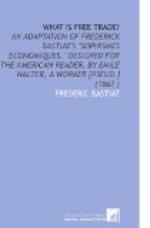CHAPTER IX.
A WONDERFUL DISCOVERY.
At this moment, when all minds are occupied in endeavoring to discover the most economical means of transportation; when, to put these means into practice, we are levelling roads, improving rivers, perfecting steamboats, establishing railroads, and attempting various systems of traction, atmospheric, hydraulic, pneumatic, electric, &c.; at this moment, when, I believe, every one is seeking in sincerity and with ardor the solution of this problem—“To bring the price of things in their place of consumption, as near as possible to their price in that of production”—I would believe myself to be acting a culpable part towards my country, towards the age in which I live, and towards myself, if I were longer to keep secret the wonderful discovery which I have just made.
I am well aware that the self-illusions of inventors have become proverbial, but I have, nevertheless, the most complete certainty of having discovered an infallible means of bringing produce from all parts of the world into the United States, and reciprocally to transport ours, with a very important reduction of price.
Infallible! and yet this is but a single one of the advantages of my astonishing invention, which requires neither plans nor devices, neither preparatory studies, nor engineers, nor machinists, nor capital, nor stockholders, nor governmental assistance! There is no danger of shipwrecks, of explosions, of shocks of fire, nor of displacement of rails! It can be put into practice without preparation almost any day we think proper!
Finally: and this will, no doubt, recommend it to the public, it will not increase the Budget one cent; but the contrary. It will not augment the number of office-holders, nor the exigencies of State; but the contrary. It will put in hazard the liberty of no one; but on the contrary, it will secure to each a greater freedom.
I have been led to this discovery, not from accident, but from observation, and I will tell you how.
I had this question to determine:
“Why does any article made, for instance, at Montreal, bear an increased price on its arrival at New York?”
It was immediately evident to me that this was the result of obstacles of various kinds existing between Montreal and New York. First, there is distance, which cannot be overcome without trouble and loss of time; and either we must submit to these troubles and losses in our own person, or pay another for bearing them for us. Then come rivers, hills, accidents, heavy and muddy roads. These are so many difficulties to be overcome; in order to do which, causeways are constructed, bridges built, roads cut and paved, railroads established, &c. But all this is costly, and the article transported must bear its portion of the expense. There are robbers, too, on the roads, sometimes, and this necessitates railway guards, a police force, &c.




